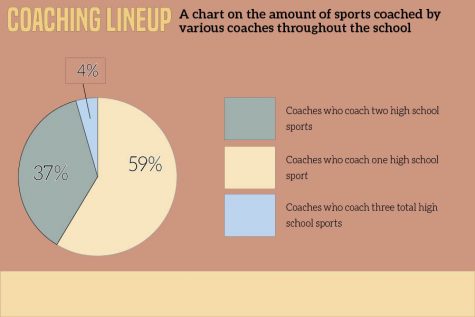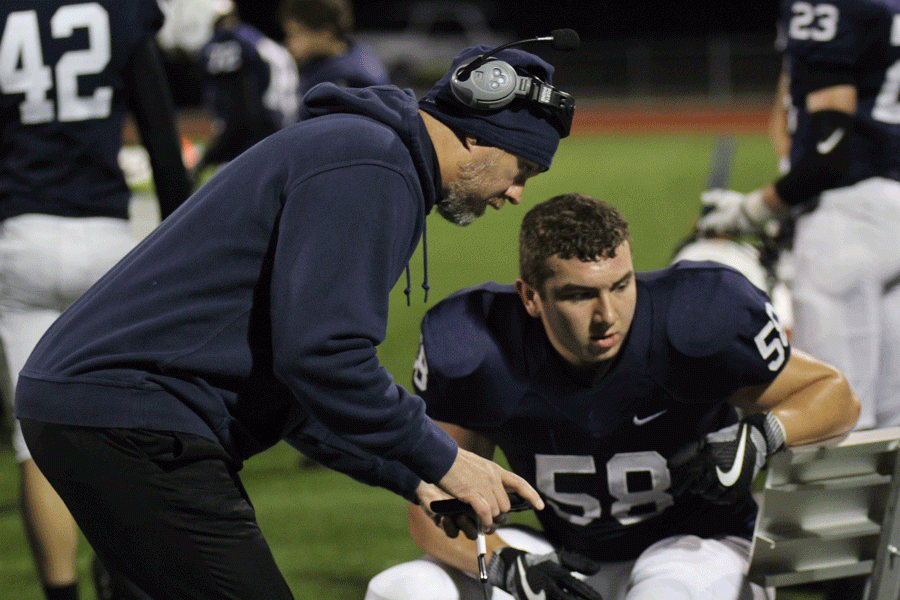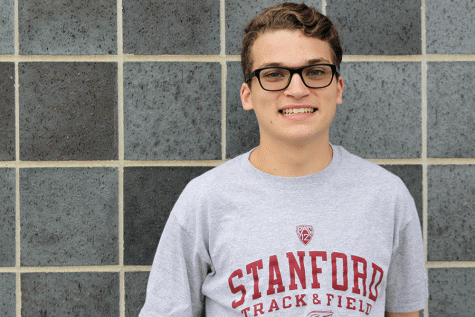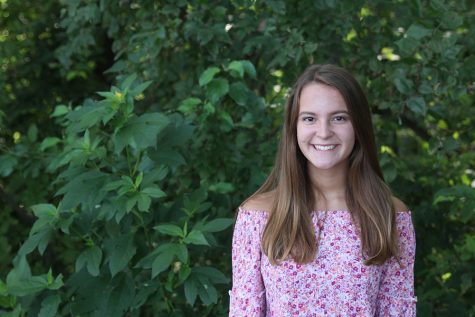Coaches train athletes in more than one sport
Through coaching multiple sports, coaches provide the extra effort to accommodate athletes and teams
During the football game against St. James on Friday, Nov. 11, football and track coach Eric Thomas reviews a play with sophomore Christian Roth.
November 25, 2016
The hectic nature of high school athletics impacts not only the athletes participating in the sport, but also on the coaches who commit all of the time and effort necessary for their team to succeed on the playing field.
This is even more evident for coaches who coach multiple sports throughout the school year, and for football and track coach Eric Thomas, this transition took some to get used to when he began his coaching tenure.
“[The] first year [of coaching] it was hard to get a read on the difference between track kids and football kids,” Thomas said. “Obviously [with track], you don’t have the physical contact and the consequence of not being ready where somebody is going to put you on your back [like in football]. If you’re not ready in track, you’re just not going to perform well. There’s a different flow.”
Once coaches adjust to the transition of coaching multiple sports, the biggest factor that contributes to juggling multiple sports is the time commitment. According to boys and girls soccer coach Arlan Vomhof, this is something the players might not realize.
“I’ve had former players come back and help me coach over the years and the first thing they tell me is they had no idea [what all] goes on behind the scenes and what the coaches have to do,” Vomhof said. “They have no clue what it takes to actually make sure everything runs. Their parents have no clue what it takes to [get all the logistics together] behind the scenes.”
Due to the overlap of seasons, the tight schedule is also difficult when one team goes on a playoff title run. This was the case last year when the football team became the 2015 5A state football champions last fall, which overlapped with the basketball team’s season prior to them becoming the 2016 5A state basketball champions.
For football and basketball coach Alex Houlton, the time crunch as a result of all of the coaching is difficult to manage at times but well worth it for him.
“Last year there was overlap where I’d go straight from football practice to basketball practice. That’ll make for a tough couple of weeks, but they’re some fun weeks,” Houlton said. “The pace is a lot different, so it’s tough to transition because the practices are so different but it keeps things interesting.”
While coaching boys soccer in the fall and girls soccer in the spring, Vomhof also feels that the pace and his coaching style varies between both seasons.
“Physically the pace is faster with the boys and it’s a lot more physical than the girls,” Vomhof said. “However, girls are more receptive to trying things that are being coached and to go along with the game plan. Boys tend to think they know everything.”

Coaching two sports allows for extra practice prior to the upcoming season and more time spent with the athletes, which benefits them in the long run according to cross country and track coach Betsy Meeks.
“The continuity between coaching distance in the fall and then in the spring is that you’re with the same group of kids both seasons,” Meeks said. “This allows you to influence their training during both seasons and during the off season as well.”
Regardless, Thomas feels that coaching multiple sports is more than worth it, especially with his family being involved.
“I played football, I loved it and I love the type of kids in football and I get to build relationships with them. You get to know such a wide range of kids,” Thomas said. “I started coaching track because I thought my daughters might get involved and it’s really grown to be something I like. Also, track is the best way to measure pure athleticism.”
Houlton finds his time as a coach rewarding when he sees the end result from assisting his athletes and being involved once again in high school athletics.
“I Iike still being active in sports and I like helping those kids and seeing them succeed. It’s a lot of fun,” Houlton said. “You can also always learn from one sport and translate it to another. You get a different perspective working with different people and you learn different things, different strategies to use.”












